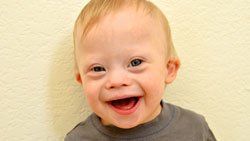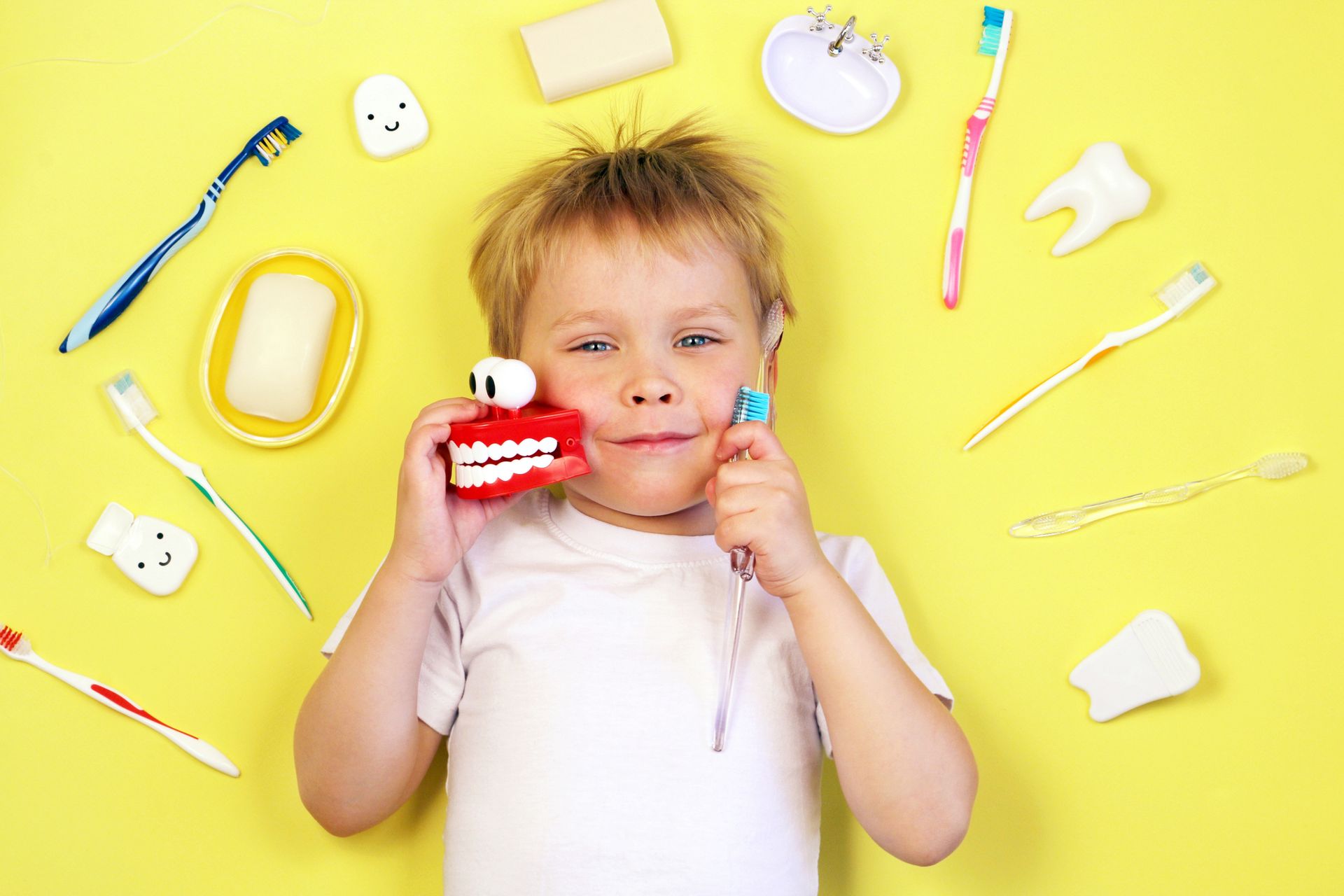Our Services

Pediatric Dentistry
Pediatric dentistry is the specialty of dentistry that focuses on the oral health of young people. Good oral health is an important part of total health. Establishing us as your child's Dental Home provides us the opportunity to implement preventive dental health habits that keep a child free from dental/oral disease. We focus on prevention, early detection and treatment of dental diseases, and keep current on the latest advances in dentistry for children.
Pleasant visits to the dental office promote the establishment of trust and confidence in your child that will last a lifetime. Our goal, along with our staff, is to help all children feel good about visiting the dentist and teach them how to care for their teeth. From our special office designs to our communication style, our main concern is what is best for your child.
Four things are necessary for cavities to form: 1) a tooth; 2) bacteria; 3) sugars or other carbohydrates; and 4) time. We can share with you how to make teeth strong, keep bacteria from organizing into harmful colonies, develop healthy eating habits, and understand the role that time plays. Remember dental decay is an infection of the tooth. Visiting us early can help avoid unnecessary cavities and dental treatment.
The pediatric dental community is continually doing research to develop new techniques for preventing dental decay and other forms of oral disease. Studies show that children with poor oral health have decreased school performance, poor social relationships and less success later in life. Children experiencing pain from decayed teeth are distracted and unable to concentrate on schoolwork.
Importance Of Primary Teeth (Baby Teeth):
It is very important that primary teeth are kept in place until they are lost naturally. These teeth serve a number of critical functions. Primary teeth:
- Maintain good nutrition by permitting your child to chew properly.
- Are involved in speech development.
- Help the permanent teeth by saving space for them. A healthy smile can help children feel good about the way they look to others.
Infants and Children
Getting an early start in regular dental care is an important step on the road to teaching your child healthy lifetime habits. We want to share with you the latest available methods for keeping your child healthy and safe.
The first dental visit should occur shortly after the first tooth erupts and no later than the child's first birthday. Beginning tooth and mouth examinations early may lead to detection of early stages of tooth decay that can be easily treated. At the first visit we will present:
- A program of preventive home care including brushing, flossing, diet and the importance of fluorides.
- A caries risk assessment.
- Information about Early Childhood Caries, which may be due to inappropriate nursing habits or inappropriate use of sippy cups.
- The latest facts about finger, thumb and pacifier habits.
- What you need to know about preventing injuries to the mouth and teeth.
- Information on growth and development.
Adolescents
Adolescents have special needs. Appearance and self-image are very important to them. Decayed or poorly positioned teeth or jaws might make them more self-conscious. Teens also eat frequently, and unhealthy snack foods tend to become a major part of their regular diet. We provide a professional, sensitive and caring approach to restoring and guiding teeth, and teaching preventive dental health care through the teen's high school years. When necessary, we will provide information on sealants, oral piercing, wisdom teeth, missing teeth and tobacco use.

Young People With Special Needs
An integral part of our education is concerned with the medical and dental health of the special patient. People with significant medical, physical, or mental disabilities often present challenges to dentists. Our training allows us to address their special needs and provide the best care possible.
Team Approach To Total Health
Good oral health is an important part of total health. When helping children, we often work with pediatricians, other physicians and dental specialists. All young people are served best through this team approach. We, the pediatric dentists, are an important part of your child's health team.
The American Academy Of Pediatric Dentistry (AAPD)
Founded in 1947, the AAPD is a not-for-profit membership association representing the specialty of pediatric dentistry. The AAPD's 7,800 members are primary oral health care providers who offer comprehensive specialty treatment for millions of infants, children, adolescents, and individuals with special health care needs. The AAPD also represents general dentists who treat a significant number of children in their practices. As advocates for children's oral health, the AAPD develops and promotes evidence-based policies and guidelines, fosters research, contributes to scholarly work concerning pediatric oral health, and educates health care providers, policymakers, and the public on ways to improve children's oral health. For further information, please visit the AAPD Web site at www.aapd.org.
Pediatric Dentistry gradually phases into General Dentistry as the development of children continues to mature. The following is the ADA definition of General Dentistry:
In 1997 the ADA House of Delegates, in response to numerous requests, adopted as policy a model definition of dentistry that defines it as: The evaluation, diagnosis, prevention and/or treatment (nonsurgical, surgical or related procedures) of diseases, disorders and/or conditions of the oral cavity, maxillofacial area and/or the adjacent and associated structures and their impact on the human body; provided by a dentist, within the scope of his/her education, training and experience, in accordance with the ethics of the profession and applicable law.
Consistent with the view of dentistry being both a science and an art, an underlying theme of the ADA definition of dentistry is the understanding that dentistry is an evolving profession. As the profession evolves, so will the complexity and scope of procedures dentists' perform.
Part of dentistry's success can be attributed to the development and continued growth of its allied dental team members—dental hygienists, dental assistants and dental lab technologists. Over time the members of this team have been educated and trained within their defined roles to aid dentists and contribute to the provision of comprehensive care to patients through the dental team approach. With the assurance that the dental team is led by a licensed dentist, an increased capacity to provide dental care will continue to be realized.
Hospital Dentistry & General Anesthesia
When I received my first surgery privileges in 1995, at Sutter Surgery Center, I was relieved that I would never again have to papoose or restrain another uncooperative and terrified child in order to provide necessary dental treatment. I take General Anesthesia very seriously, and although its' safety record is impressive, it is never considered routine. Children have less "physiological reserve" than adults, and consequently need more careful monitoring of response, while being maintained in a more narrow vitals zone. Clearly, patient response, and medical mitigation of rare genetic/metabolic conditions, like malignant hyperthermia, is more comprehensively measured and managed in a Hospital O.R. or accredited Surgery Center; with an Anesthesiologist, or an Anesthesiologist monitored Nurse Anesthetist (as at Kaiser Hospital). The better the medical resources are, the safer the patient will be.
Shortly after gaining privileges at Sutter SC, I was also granted privileges at Methodist Hospital and at Kaiser Hospital. I have gained invaluable experience from the few thousand patients I have treated under General Anesthesia, and I feel confident in recommending this modality to properly screened children and adults. We almost always attempt treatment in the office setting first; however, it is an invaluable resource to have access to these facilities for the patient that is unable to be treated in the office setting.
If your child is scheduled to have dental treatment at a facility with General Anesthesia you will be given specific oral and written pre-op instructions to safely prepare for the procedure. For example, your child must not have anything in their stomach prior to receiving General Anesthesia. Consequently, your child cannot have anything to eat or drink after midnight (12PM), the night before the appointment. Please let the Nurse, Anesthesiologist or Dentist know if you suspect your child may have consumed something. Most Dental treatment under General Anesthetic is completed within 2 hours, with an additional 45min. to 1hr. recovery time. Most children will return to normal by the early evening, or sooner.
A welcome and unexpected "side effect" of treatment under General Anesthesia is often a lessened fear of the Dentist in the office setting. We see this phenomenon in approximately 50% of children that return to the office for the 3-week post-op check. Perhaps it is a consequence of restoring dental health and comfort to a child who feared the process, but who has no negative memory to associate with the treatment.
If you are interested in learning more, speak to me or one of my associates. My very knowledgeable Hospital coordinator Maria is also available to answer specifics about State mandated Medical insurance coverage of children up to age 7 years old; for General Anesthesia administered for Dental treatment. Under State law, children to age 7, and disabled patients with no Sunset age limitations, are entitled to Medical insurance payment for General Anesthesia and out-patient Hospital care fees, for the treatment of Dental diseases.
What Is General Anesthesia?
General anesthesia is a controlled state of unconsciousness that eliminates awareness, movement and discomfort during dental treatment. A physician or dentist with specialized training can use various medications to provide general anesthesia for patients receiving dental care.
Who Should Receive General Anesthesia For Dental Treatment?
General anesthesia may be indicated for children with extensive dental needs who are extremely uncooperative, fearful or anxious or for the very young who do not understand how to cope in a cooperative fashion. General anesthesia also can be helpful for children requiring significant surgical procedures or patients having special health care needs.
Is General Anesthesia Safe?
Although there is some risk associated with general anesthesia, it can be used safely and effectively when administered by an appropriately-trained individual in an appropriately-equipped facility. Precautions are taken to protect your child during general anesthesia; personnel who are trained to manage complications will monitor your child closely. Your pediatric dentist will discuss the benefits and risks of general anesthesia and why it is recommended for your child.
What Special Considerations Are Associated With The General Anesthesia Appointment?
A physical evaluation is required prior to general anesthesia for dental care. This physical assessment provides information to ensure the safety of your child during the general anesthesia procedure. Your pediatric dentist or general anesthesia provider will advise you about evaluation appointments that are required.
Parents are instructed to report to the pediatric dentist any illness that occurs prior to the general anesthesia appointment. It may be necessary to reschedule the appointment. It is very important to follow instructions regarding fasting from fluids and foods prior to the appointment.
Your child will be discharged when stable, alert, and ready to depart. Patients often are tired following general anesthesia. You will be instructed to let the child rest at home with minimal activity until the next day. Post-operative dietary recommendations also will be given.
Free Pre-School Exams
I think giving a free Dental exam for school is a great way for a Parent and Child to see if they like our practice. It also introduces/ reinforces the importance of caring for their teeth. Children will receive a visual exam as required by State law. We will record our findings on the State School document, and provide it to you at no charge.
If you would like a complete Dental Exam, Dental Cleaning, XRays and Fluoride Tx for your Child, it is only $59 ($266 value!). Get a further discount of $10 each, if you write a Google review, a Yelp review, and/or Refer a Friend. That is $30 off, or $29 total cost! Your child will also receive one Raffle ticket/ review, to enter to win an iPad, Nexus7 or Kindle Tablet. Good Luck, Dr. Mike.
Free Second Opinions
I encourage my patients to get a second opinion on exams and treatment plans that I or my associates provide. I also encourage people to communicate their questions or concerns to us freely, yet I understand the discomfort some people may feel in questioning our treatment plan directly. I openly encourage Parents to be certain of their choices, after receiving our full exam and treatment plan, by seeking another exam, from another Dentist; for clarity and certainty. If you like, you may choose another Dentist in our office for a second opinion, or select your own.
When a Parent brings their Child to me for a second opinion, I do not charge them. My assessment will be honest and fact-based. I have no expectation of winning you over and treating your Child, but I do want to help you expedite your Child's care. I achieve this by not bringing extra cost as a barrier to your Child receiving any necessary treatment.
Community Outreach
We provide the following outreach services to Pre-Schools, Grade Schools, Health Fairs, Mommy and Me groups, Training and Educational Agencies and Societies, etc…;
In Office Field Trips.
Preventative Dental Demonstration (at your site, home, etc…).
Health Fairs.







